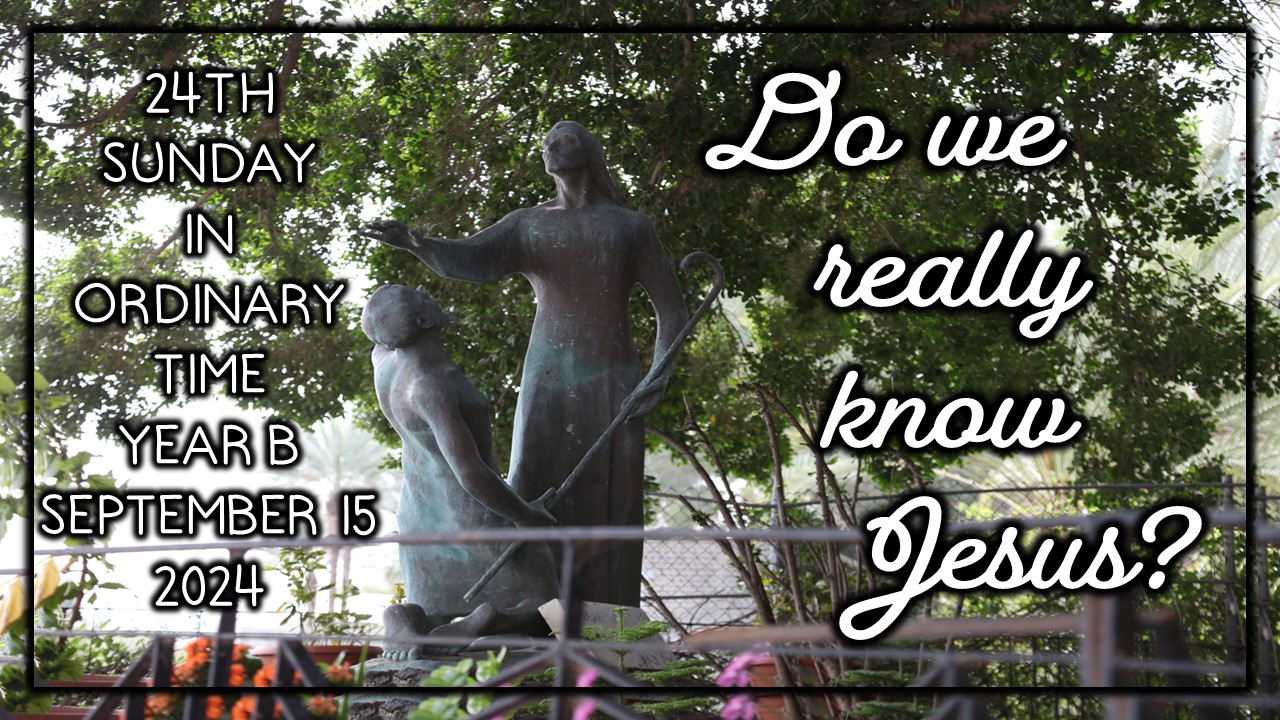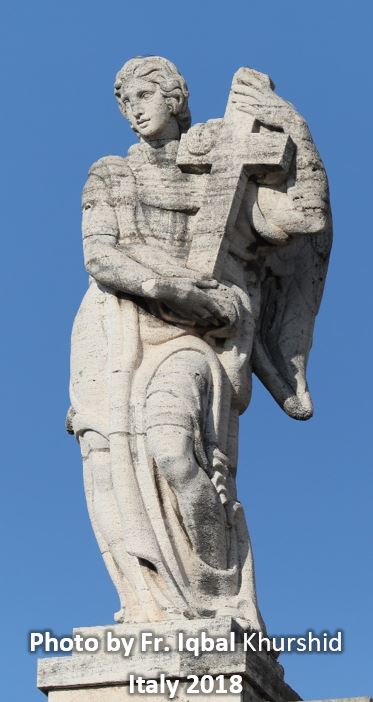
24TH SUNDAY IN ORDINARY TIME YEAR B ~ SEPTEMBER 15, 2024
DO WE KNOW JESUS?
Last Sunday we meditated on the divine power of Jesus who healed the man who was deaf and had an impediment in speech. We learned that God has given us ears to listen to him and lips to proclaim his name to all the nations. Today the Lord wants us to question ourselves, if we know him, how good do we know him? Today is the real test of his disciples and for us. Is Jesus for us? There are two questions: one impersonal and other personal. Which one is easy to answer? I will leave it up you to decide.
In the foreword to the first volume of his Jesus of Nazareth, Benedict XVI reveals the deep theological and pastoral concern that inspired his labors. Owing to certain currents in biblical studies from the 1950s on, an impression has become widely diffused that “we have little certain knowledge of Jesus and that only at a later stage did faith in his divinity shape the image we have of him.”
This theological challenge has immediate pastoral consequences. Benedict rightly discerns that this constitutes “a dramatic situation for faith, because its point of reference is being placed in doubt: Intimate friendship with Jesus, on which everything depends, is in danger of clutching at thin air.” Intimate friendship with Jesus is the heart of the matter.
Pope Benedict had already sounded a similar theme in his first encyclical, Deus Caritas Est. In a much-quoted sentence, he writes: “Being Christian is not the result of an ethical choice or a lofty idea, but the encounter with an event, a person, which gives life a new horizon and a decisive direction. Saint John’s Gospel describes that event in these words: “God so loved the world that he gave his only Son, that whoever believes in him should. . .have eternal life.” (3:16)
This “encounter” by its very nature is destined to grow into an abiding “friendship” as the Last Supper Discourse in Saint John’s Gospel makes clear. “No longer do I call you servants. . .but I have called you friends.” (Jn 15:15) “Abide in me and I in you. . . .He who abides in me, and I in him, bears much fruit, for apart from me you can do nothing.” (Jn 15:4-5)
I would like to explore three dimensions of “friendship with Jesus” that may serve us as we all seek to appropriate and deepen this call to friendship with the Lord.
First is what the liturgical and theological Tradition speaks of as the “prevenient” love of Jesus. Friendship with Christ is not our initiative nor is it within our natural capacity. It depends utterly on the initiative of Jesus. “Love of Jesus” is, in the first instance, Jesus’ love of us. Saint Paul is firm in his persuasion: “the Lord Jesus who loved me and gave himself for me.” (Gal 1:20). Our love of Jesus is our grace-endowed and grateful response to his love of us even to death, death on a cross. I can still remember the deep affection with which, as a youngster participating in the Stations of the Cross, I joined with many in professing: “I love you, Jesus my love, I repent of having offended you.”
A second dimension of friendship with Jesus flows from this. Namely, the love of Jesus gives rise to our knowledge of Jesus. My primary knowledge of the Lord is that of his love for me. To adapt Paul: I know “the Lord Jesus who loves me and gives himself for me.” Real, not merely notional, knowledge of Jesus is the abiding fruit of love of Jesus. And the experiential setting for this knowledge is the Church’s celebration of the Eucharist where Jesus’ loving self-gift is re-presented and made actual.
The third dimension of our friendship with Jesus is already adumbrated in the previous quote from Paul. As Paul and all the saints bear witness: growth in friendship with Christ entails an ever more generous embrace of his Cross. In the Letter to the Philippians Paul recounts his own experience of “cruciformity.” He speaks of the life-giving loss of all he had formerly counted of worth, the prideful pomp of the “flesh:” pedigree, accomplishments, death-dealing zeal for the ego-inflating cause. All unmasked as vanity in the revelatory light of “knowing Christ Jesus my Lord.” (Phil 3:8)
Once upon a time there was a mentally challenged individual that worked at a local supermarket. There was a time when the store presented an “Employee of the Month” award to its staff. Every month whoever was the recipient of that honour, would brag about it and show off the plaque to the store’s customers for weeks after. This individual never got the honour. However, one day a lady met him in the grocery store and asked the young man to help her load some bags into her car. In the conversation that ensued, she asked if he had received the recognition plaque this year. He said, no, and went on to explain that the store had intention to consider giving him one. He became clearly emotional and distraught discussing it. It seemed that it made him feel so sad that his work, which clearly helps him to define himself, would never be appreciated. Seeing how much this person cared about this honor, she decided to take it upon herself to do something about it. So, every year at Christmas time, for the last several years, she gets a recognition plaque made–complete with this man’s name and picture–and awards it to him in the parking lot when he helps her with her groceries. He was so overcome that someone took the time to recognize his work that he would often break down and cry when she would give him the award. We can see in the Sacred Scripture today that God knows us and rewards us with the gifts. But how about us, do we know God and Jesus? Who are they for us? These are very important question for us to understand as the Word of God this week opens our hearts and minds to know and understand.
In the First Reading Prophet Isaiah is presenting one of the Messianic songs to us which speaks about the attributes of the servant. This song is all about the Lamb, Jesus the Saviour. There are few very important attributes we need to carry or find in our lives.
- God opens our ears as we heard from last Sunday’s Gospel that Jesus healed a man who was deaf and mute. We listen the voice of the Lord to be obedient not rebellious. Unfortunately, in our current times “listening” is vanishing and people are becoming rebellious. If we listen, our pain, suffering and persecution turn into joy. In the life of Jesus that we important because “he became obedient to death even death on a cross” and “Therefore God also highly exalted him and gave him the name that is above every name”.
- God is a helper and protector to those who trust in him “The Lord God helps me; therefore I have not been disgraced…” God does not forget or forsake but loves us “I have written your name on the palms of hands” and as St. Paul says “If we have died with him, we will also live with him; if we endure, we will also reign with him; if we deny him, he will also deny us; if we are faithless, he remains faithful— for he cannot deny himself”. Throughout our salvation history God has never left his people but walks with them “I am your God and you are my people”.
- When God is with us who can separate us from him? Jesus though suffered, always trusted in his Father whose will he came to do. God stood by his Son’s side to strengthen him in the times of trial, suffering and crucifixion and Jesus never forgot that but looked at his Father “Father, forgive them” and I commend my spirit into your hands”. In our pain and suffering if we trust in the Lord God then we can claim like Prophet Isaiah “It is the Lord God who helps me’ who will declare me guilty?”.
The Responsorial Psalm on the other hand shows us the depth of our relationship with God the Father “I will walk before the Lord, in the land of the living”. This Psalm has such a wonderful way of expressing our feeling that should become our daily prayer “I love the Lord, because he has heard my voice and my supplications”. Secondly this Psalm does invite us to examine ourselves to see if we know God and Jesus his “Beloved Son Jesus Christ”. If we know that we will only trust in him and pray to him. Do we really know him?
St. James in the Second Reading is really bringing us to the point where we need to test our faith. Faith without works and works without faith is an empty vessel which produce loud noise and nothing else. Jesus says in the Gospel of St. John “by your works people will that you are my disciples”. Is not amazing to see that our Faither and Works they go hand in hand? How do we show our faith in the Lord?
Sometimes we may have more knowledge of the universe but don’t know about Jesus like in this story.
A popular speaker started off a seminar by holding up a $20 bill. A crowd of 200 had gathered to hear him speak. He asked, “Who would like this $20 bill?”
200 hands went up.
He said, “I am going to give this $20 to one of you but first, let me do this.” He crumpled the bill up.
He then asked, “Who still wants it?”
All 200 hands were still raised.
“Well,” he replied, “What if I do this?” Then he dropped the bill on the ground and stomped on it with his shoes.
He picked it up and showed it to the crowd. The bill was all crumpled and dirty.
“Now who still wants it?”
All the hands still went up.
“My friends, I have just showed you a very important lesson. No matter what I did to the money, you still wanted it because it did not decrease in value. It was still worth $20. Many times, in our lives, life crumples us and grinds us into the dirt. We make bad decisions or deal with poor circumstances. We feel worthless. But no matter what has happened or what will happen, you will never lose your value. You are special – Don’t ever forget it!
What use of knowing everything but Jesus?
Holy Father Pope Francis reflecting on the Gospel says “Today’s Gospel passage turns to the question that permeates the whole Gospel of Mark: who is Jesus? But this time Jesus himself poses it to his disciples, helping them to gradually address the question of his identity. Before asking them, the Twelve, directly, Jesus wants to hear from them what the people think about him, and he is well aware that the disciples are very sensitive to the Teacher’s renown! Therefore, he asks: “Who do people say that I am?”. It comes to light that Jesus is considered by the people as a great prophet. But, in reality, he is not interested in the opinions and gossip of the people. He also does not agree that his disciples should answer the questions with pre-packaged formulas, quoting well-known individuals from Sacred Scripture, because a faith that is reduced to formulas is a short-sighted faith”.
Does Jesus really need human testimony about him? Why was there a need that Jesus has to ask the questions about himself? Jesus doesn’t need human testimony because “Not that I accept such human testimony, but I say these things so that you may be saved”. In his First Letter St. John says, “If we receive human testimony, the testimony of God is greater; for this is the testimony of God that he has testified to his Son”. There could be several reasons behind these two questions. The Lord wants his disciples of yesterday and today to establish a personal relationship with him, and thus to embrace him at the centre of their life. For this reason, he spurs them to face themselves honestly, and he asks: “But who do you say that I am?” Secondly Jesus wants to see the depth of his disciples’ faith as they have heard him speaking and have seen him performing miracles of healing. Thirdly he wants to see the maturity in their relationship with him. Fourthly he wants to see their strength against the things rising against their proclamation etc.
Who Jesus is for us? The greatest truth of all is that Jesus is God. The only way we can know God is through Jesus, for he himself is God. He said: “No one comes to the Father except through me.” And that is why the greatest error of all is to deny Jesus as God. The atheists, who claim there is no God, are terribly mistaken, and so are all who do not recognize Jesus as God. It is just so sad to see more and more people being deceived by the devil, and they live in the greatest error of denying the divinity of Jesus. And there are many false religions and false preachers all over, all of them instruments of the devil in spreading lies, deceptions and confusion in the world. What a pity for Catholics who fall into their hands. That is why it is very important to protect and strengthen our faith. I believe somewhat Covid has played the same role to make people believe that Jesus is not there. How sad it is to see people turning from Jesus because of a tiny virus but not having the faith like a tiny seed (mustard seed)?
Knowing Jesus is resolution to all our problems because he not only obeyed his Father but also for us on the Cross to grant us eternal life. I believe the following story will help us to examine ourselves to see our relationship with the Lord.
One night four college kids stayed out late, partying and having a good time. They paid no mind to the test they had scheduled for the next day and didn’t study. In the morning, they hatched a plan to get out of taking their test. They covered themselves with grease and dirt and went to the Dean’s office. Once there, they said they had been to a wedding the previous night and on the way back they got a flat tire and had to push the car back to campus.
The Dean listened to their tale of woe and thought. He offered them a retest three days later. They thanked him and accepted his offer.
When the test day arrived, they went to the Dean. The Dean put them all in separate rooms for the test. They were fine with this since they had all studied hard. Then they saw the test. It had 2 questions.
1) Your Name __________ (1 Points)
2)Which tire burst? __________ (99 Points)
Options – (a) Front Left (b) Front Right (c) Back Left (d) Back Right
Today, Jesus addresses this very direct and confidential question to each of us: “You, who do you say that I am? All of you, who do you say that I am? Who am I for you?”. Each person is called to respond, in his or her heart, allowing each one to be illuminated by the light that the Father gives us in order to know his Son Jesus. And it can also happen to us, as it did to Peter, that we passionately affirm: “You are the Christ”.
Do we really know who Jesus is for us?
Other Sermons In This Series

22nd Sunday in Ordinary Time Year C ~ August 28, 2022
August 26, 2022

6th Sunday in Ordinary Time Year C – February 13, 2022
February 11, 2022
4th SUNDAY OF LENT – YEAR C ~ MARCH 30, 2025
March 27, 2025

